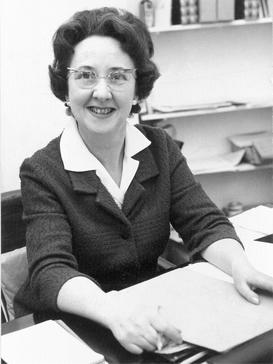Beatrice de Cardi facts for kids
Quick facts for kids
Beatrice de Cardi
|
|
|---|---|
 |
|
| Born | 5 June 1914 London, England
|
| Died | 5 July 2016 (aged 102) London, England
|
| Nationality | British |
| Education | St Paul's Girls' School |
| Alma mater | University College London |
| Title | Secretary of the Council for British Archaeology (1949–73) |
| Awards | Officer of the Order of the British Empire (1973) Burton Memorial Medal of the Royal Asiatic Society (1993) Gold Medal of the Society of Antiquaries of London (2014) |
Beatrice Eileen de Cardi (born 5 June 1914 – died 5 July 2016) was a famous British archaeologist. She studied ancient cultures in the Persian Gulf and the Baluchistan area of Pakistan. Beatrice de Cardi was also the president of the British Foundation for the Study of Arabia. From 1949 to 1973, she worked as the Secretary of the Council for British Archaeology. She was known as the world's oldest working archaeologist at the end of her career.
Contents
Discovering Ancient Worlds
Early Life and Education
Beatrice de Cardi was born in London, England, on 5 June 1914. Her father, Edwin de Cardi, was from Corsica, and her mother, Christine Berbette Wurfflein, was American. She went to St Paul's Girls' School. However, she had to pause her studies sometimes due to illness.
From 1933 to 1935, she studied history, Latin, and economics at University College London. She also learned about archaeology from a well-known archaeologist, Sir Mortimer Wheeler.
Starting Her Archaeology Career
Beatrice de Cardi began her training helping Sir Mortimer Wheeler. She worked at the Iron Age fort of Maiden Castle in southern England. There, she learned how to sort and identify ancient pottery. This sparked her lifelong interest in pottery.
After finishing her studies in 1936, she became Wheeler's secretary. This was at the London Museum. Later, she became his assistant.
Archaeology During Wartime
During World War II, Beatrice de Cardi worked for the War Cabinet in China. She was based in Chungking and often visited India. She became very interested in this part of the world.
After the war, she worked as Britain's Assistant Trade Commissioner. She was based in Karachi, Delhi, and Lahore. From these cities, she started doing archaeological surveys in western Baluchistan.
Exploring Baluchistan
Beatrice de Cardi's work in Baluchistan involved finding old objects. She collected pieces of pottery, copper items, bones, and flint from many sites in Jhalawan. She worked with Sadar Din, an official from the Pakistani Archaeological Department. Sir Mortimer Wheeler, who was then Director General of Archaeology in India, had recommended Din to her. Together, they found 47 ancient sites.
After some time away due to political problems, de Cardi returned to Baluchistan in 1966. She found unique pottery near the Bampur River. This discovery helped experts understand how trade worked in the Persian Gulf during the Bronze Age.
Discoveries in the Persian Gulf
Beatrice de Cardi also did important work in the Persian Gulf. She led several trips to the United Arab Emirates. There, she found the first examples of Ubaid pottery in the region. This pottery showed ancient trade links. She also discovered over 20 tombs from around 2000 BC.
In 1973, the government of Qatar asked her to lead an archaeological trip. The goal was to find items for the new national museum. Her team found old tools and pottery. These finds showed that Qatar had traded with other areas much earlier than people thought.
After her work in Qatar, de Cardi continued her research in Oman and the United Arab Emirates. When she was about 93, she stopped doing fieldwork. She then focused on writing about her discoveries and organizing her research.
She once said about her work, "I am not a woman or a man when I am working in the Gulf or anywhere else. I am a professional and they have always accepted that."
Awards and Recognition
From 1949 to 1973, Beatrice de Cardi was the assistant secretary, then secretary, of the Council for British Archaeology. The Council started an annual talk in her honor in 1976. It is called the Beatrice de Cardi Lecture. Later, the Council named its main office Beatrice de Cardi House.
In 1973, she received the OBE award for her great work in archaeology.
In 1989, she was given the Al Qasimi Medal. This award was for her archaeological work in Ras Al Khaimah in the United Arab Emirates. She was the first woman to receive this medal. In 1993, she received the Burton Memorial Medal from the Royal Asiatic Society.
From 1995, Beatrice de Cardi was an Honorary Fellow at University College London. In June 2014, she turned 100 years old. She was then awarded the Gold Medal of the Society of Antiquaries of London. This was for her outstanding contributions to archaeology.
Personal Life
Beatrice de Cardi had two fiancés. Her first fiancé died during World War II. Her second fiancé passed away in a riding accident in Qatar while they were working there together.
Later Years
Beatrice de Cardi died at the Chelsea and Westminster Hospital on 5 July 2016. This was due to problems from a fall she had suffered about six weeks earlier.
 | May Edward Chinn |
 | Rebecca Cole |
 | Alexa Canady |
 | Dorothy Lavinia Brown |

